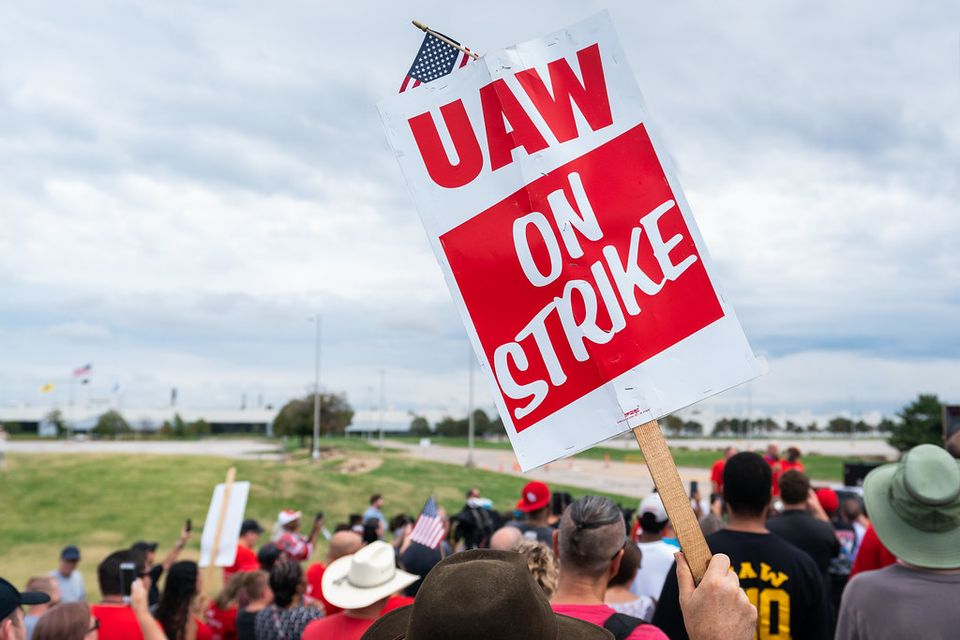Has Climate Made Up With Labor? (and Other Messy Conversations)

Months ago, a lot of folks in the climate community saw a big problem looming on the horizon: electrification is happening in transport more quickly than anyone predicted, and automakers were gearing up to use it as an excuse to cheap out on workers and erode the power of unions in the industry.
Historically, telling labor that environmental policy is bad for workers has been a pretty effective strategy. Back in the early 1900s, environmentalists and labor unions often shared common enemies: Don't forget it was coal companies on the receiving end of many of the first major labor strikes in a lot of countries. Fossil fuel companies spotted this as a problem early on and made big moves to ally themselves with labor, paying higher-than-average wages for unskilled jobs, committing to long-term job security, providing great benefits; and the unions in turn would show up for the industry when it needed to fight a green building code, environmental regulation or climate policy.
This time it didn't work. When auto execs and politicians like Josh Hawley (R-MO) tried to say that electrification or "climate policy" was to blame for low salaries or the loss of jobs, United Auto Workers union president Shawn Fain simply wasn't here for it. Quickly and clearly he corrected it every time: That's not why this is happening, it's happening because of x, y, and z and also if any of that were true executive pay wouldn't have increased so much over the same period of time. Boom. Simple. And the message consistency was awe-inspiring. But also for the first time since I started covering climate 20 years ago, I saw the climate movement show up for labor in real and productive ways. I heard from organizers that were working tirelessly behind the scenes to make sure that climate folks understood what was at stake here and that they didn't fuck it up.
And it WORKED. The whole "it's climate policy's fault" talking point never stuck, the union won, and the climate movement learned another important lesson about intersectionality. It's the first glimmer of hope I've seen that climate and labor could really be friends, and hell I think we could all use some optimism at the moment.
Encouraging Journalists To Be Lazy Is Not A Climate Solution!
Been ranting a lot about something lately and thought it might make sense to share that rant with this community: there is an increasing desire in the climate NGO space to want to effectively do journalists' jobs for them, to provide all the investigative work, research, source vetting, and documents to tee up an investigation. I understand the drive. Climate coverage is better now than it's ever been but it's still not great and I can count the number of investigative climate journos with the time, bandwidth and skills to do their own enterprise reporting on one hand...okay maybe two. BUT, training journalists to be lazy is a dangerous game. Training newsrooms to leave investigative work to someone else is an even more dangerous one. Today you've got that NYT reporter checking sources with you; do you really think they'll be impervious to the influence of your enemy tomorrow? In an interview years ago the great Melissa Aronczyk got me really focusing on the entire PR apparatus as being a problem – the warping of information, the hijacking of the media, is a net negative for democracy, whether it's being done by someone you agree with or not. I wish climate NGOs would invest instead in actual newsrooms, or in the organizations training folks in the newsrooms (like Covering Climate Now for example). A lot of NGO investigators were formerly journalists, pushed out either because it's damn near impossible to make a living as an investigative journalist or because they were consistently being muzzled by the higher ups. It'd be great to see literally ANY of the orgs focused on climate, particularly climate and disinfo, turn their attention to fixing the structural issues in #media rather than exploiting them.
Introducing: Messy Conversations, a Drilled Miniseries
Something that can make climate a difficult topic to report on, or even just talk about, is that it's often quite complicated and nuanced. People don't like to hear that because they think complexity and nuance scares people off. Maybe it does, but wishing it were simpler doesn't make it so, and avoiding messy conversations never leads to real solutions.
With that in mind, I've been talking through some thorny issues with folks lately. Sometimes they're rather unexpected. This week, for example, we put out an episode of the podcast featuring a conversation I had with Magatte Wade, who heads up the Atlas Network think tank The Center for African Prosperity. That conversation happened because Magatte was pretty pissed off about our coverage of Atlas and took to Twitter to challenge myself, my co-reporter, and our editor to a debate. I had actually tried to interview her for the piece, so asked if she'd go for a conversation over a debate and she agreed (although when she sent me the audio recording later, it was labeled Magatte v. Amy!). I'm not sure how productive it was in terms of shifting Magatte's thinking on anything, but it helped me think through the complexities of addressing poverty and climate change at the same time and why it's really important that the climate movement not separate those two issues. In doing so, I think climate folks have left the door open for accusations of elitism, of privileging solar panels in Los Angeles over basic needs in Nairobi.
It's good timing to have this episode out as Wade meets with lots of like-minded folks at the Alliance for Responsible Citizenship (ARC) forum in London this week. This is a new group led by Jordan Peterson and bringing together anti-ESG folks, anti-climate folks, anti-trans folks and anti-feminism folks into one big tent. The Brexit folks are there, half of Australia's conservative politicians are there, Mr. "Woke Capital" himself GOP candidate Vivek Ramaswamy is there, as are climate skeptics Bjorn Lomborg, Michael Shellenberger, and Alex Epstein, author of "The Moral Case for Fossil Fuels. I got a tip about them months ago that I forwarded to the good folks at DeSmog who pulled together a super helpful profile and ongoing reporting on ARC. This group is yet another example of how, ironically, the right is so much better at intersectionality than the folks they mock for valuing such things. While many climate folks still struggle to wrap their heads around how the climate crisis intersects with race, class, and gender, the folks fighting against climate action connect the dots on those issues all the time. Again, as I've been saying for years now: the climate movement ignores class and race at its peril. If you don't care about equity for moral or ethical reasons, you should care about it if you want to see meaningful climate action and real policy wins in our lifetime; racism, classism, and sexism are weaknesses—they can, have been, and will be exploited against the climate movement until it becomes truly intersectional.
Next up: Rhiana Gunn-Wright, climate policy director at Roosevelt Institute and one of the original architects of the Green New Deal. Actually Rhiana and I got into a pretty similar discussion about how to address the climate crisis in equitable ways. She's one of my favorite people to talk to about this stuff, so certainly a less debate-y conversation, but veered into some similar territory and got into the messy details around how to handle an energy transition. And finally, I spoke with the great Akshat Rathi, senior climate reporter at Bloomberg, about his new book, Climate Capitalism. Which initially I wasn't so sure about, I'm not gonna lie! But actually Akshat took a very nuanced, thoughtful look at how to harness capitalism against the climate crisis and why he believes that's possible. I hope you'll listen, and please feel free to send feedback. These are touchy subjects that people have big feelings about and I know there's still more reading for me to do on these issues!
This Week's Climate Must-Reads
- ‘A titan of the climate movement’: tributes pour in for Saleemul Huq - What a tremendous loss for the world, especially as we head towards yet another COP during which rich countries are looking hesitant about fulfilling their commitments to contribute to Mr. Huq's brainchild: the loss and damage fund.
- The Struggles of the Offshore Wind Industry – Excellent read from the FT on what it's going to take to scale up offshore wind and make it sustainable.
- A new report calls chemical recycling a ‘dangerous deception’ — and a former plastic lobbyist agrees - "Advanced recycling" or "chemical recycling" is a modern version of the petrochemical industry's old tricks, effectively burning plastic to turn it into a low-grade fossil fuel, which can then be used either as fuel or as a feedstock for more plastic. Somehow this is "green." A new report from the nonprofits Beyond Plastics and the International Pollutants Elimination Network, or IPEN, says chemical recycling is a “dangerous deception” that will only exacerbate pollution and environmental injustice while failing to address the plastics crisis.
- Inside the Campaign That Put an Oil Boss in Charge of a Climate Summit - I worked for months on this piece for The Intercept with Ben Stockton at the Centre for Climate Reporting and compiled a pretty comprehensive look at the PR campaign to turn Al Jaber into a green leader and what he's actually accomplished.
- Biden Has a Profound Choice to Make on Liquefied Natural Gas Expansion - A new report finds that LNG exports may be even worse for the environment than coal. In The New Yorker, Bill McKibben says that means the Biden Administration faces one of its most profound climate choices this autumn: Should it continue to allow the expansion of liquefied-natural-gas exports, or should it halt the rapid buildout of this industry at least until it can come up with new guidelines?





